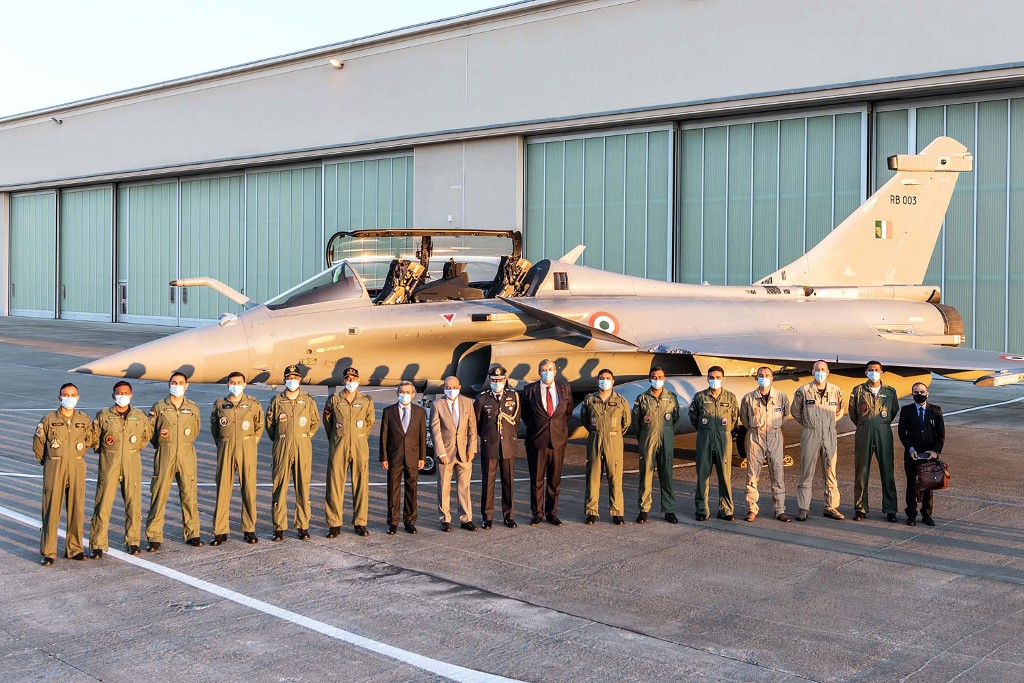NEW DELHI: India on Wednesday received its first consignment of the controversial, multibillion-dollar French Rafale fighter jets, amidst escalating tensions with China over the disputed Himalayan territory of Ladakh.
Piloted by officers of the Indian Air Force (IAF), the five jets landed at the Ambala airbase in the Indian state of Haryana on Wednesday afternoon after covering a distance of 7,000 kilometers.
The jets began their journey from Merignac in southwest France on Monday and refueled midair, before taking a day’s break at the French airbase in Al Dhafra in the United Arab Emirates (UAE).
“This aircraft has very good flying performance, and its weapons, radar and other sensors and Electronic Warfare capabilities are amongst the best in the world. Its arrival in India will make the IAF much stronger to deter any threat that may be posed on our country," Defense Minister Rajnath Singh tweeted on Wednesday.

A handout picture taken and released on July 27, 2020 by Dassault Aviation shows Indian pilots, Dassault Aviation CEO Eric Trappier next to Indian Ambassador Jawed Ashraf and officials posing before an Indian Air Force Rafale aircraft at Merignac air base, southwestern France. (AFP)
This is the first major acquisition of the fighter planes by India in more than two decades and comes at a time when the border tension between New Delhi and Beijing is at an all-time high, with Singh saying the Rafale was an "answer to anyone threatening India’s territorial integrity."
“I would like to add, if it is anyone who should be worried about or critical about this new capability of the Indian Air Force, it should be those who want to threaten our territorial integrity," he said.
Meanwhile, defense experts termed the arrival of the French jets as a “game-changer” for the country.
“It is undoubtedly a game-changer," former Air Marshal Kapil Kak told Arab News, likening it to "a wrestler entering the ring and challenging the adversary to come and join the fight."
“This is the best combat aircraft. It has a highly superior sensor, phenomenal warfare capability ... air dominance capability and is called Medium Multi-Role Combat Aircraft (MMRC). The selection process took nearly ten years," Kak said.
The acquisition of the aircraft follows a 2016 deal between Prime Minister Narendra Modi and French company Dassault Aviation for the purchase of 36 fighter jets at a cost of $9.4 billion.
However, the deal was mired in political controversy after the opposition Congress party alleged that it was a scam.
Citing an investigation by a local English newspaper, The Hindu, the Congress added that the deal signed by Modi for 36 jets was at €246.11 million ($276 million) which was far more expensive than the estimated cost of the agreement for 126 aircraft negotiated initially by the previous Congress-led United Progressive Alliance (UPA) government.
The matter went to court but the Indian Supreme Court, in a controversial decision, refused to review the deal.
Revisiting those claims, Singh said on Wednesday that they were baseless.
“The Rafale jets were purchased when they fully met the operational requirements of the IAF. The baseless allegations against this procurement have already been answered and settled," he said.
The arrival of the fighter jets on Wednesday generated a media frenzy, with several linking the new acquisition to New Delhi's ongoing tensions with China.
Indian and the Chinese troops came to blows for the first time in 45 years on June 15 in Ladakh's Gulwan valley, resulting in the loss of 20 Indian soldiers and a build-up along the border from both sides.
Five rounds of talks between the two sides have followed since, but they have failed to yield any substantial results.
“Undoubtedly, there has been a media frenzy about the arrival of the fighter jet. At a time when the nation is aware of the intrusion on the Ladakh frontier by the Chinese, which has not been undone in the last three months. This is a way of releasing societal anxieties to oversee the potential of new acquisition as a kind of panacea," Kak said.
Meanwhile, a defense expert and editor of a popular defense news magazine, Force, said that the media frenzy surrounding the arrival of the fighter jets points at a "heightened nationalistic fervor."
“Unnecessary media frenzy shows both ignorance of the weapon system and heightened nationalistic fervor. Remember, no single weapon system is a game-changer in war,” Pravin Sawhney told Arab News.
“It will take a minimum of 18 months for the entire Rafale squadron to get integrated and operationalized for high altitude warfare. So they will not be available for the present Ladakh crisis," he said, before dismissing the "Chinese angle" from the narrative.
“Chinese are not interested in fighting. If they did, they would fight on their strengths, which are ballistic and cruise missiles, and electronic warfare. Why will they fight on your supposed strength in air combat?”
























